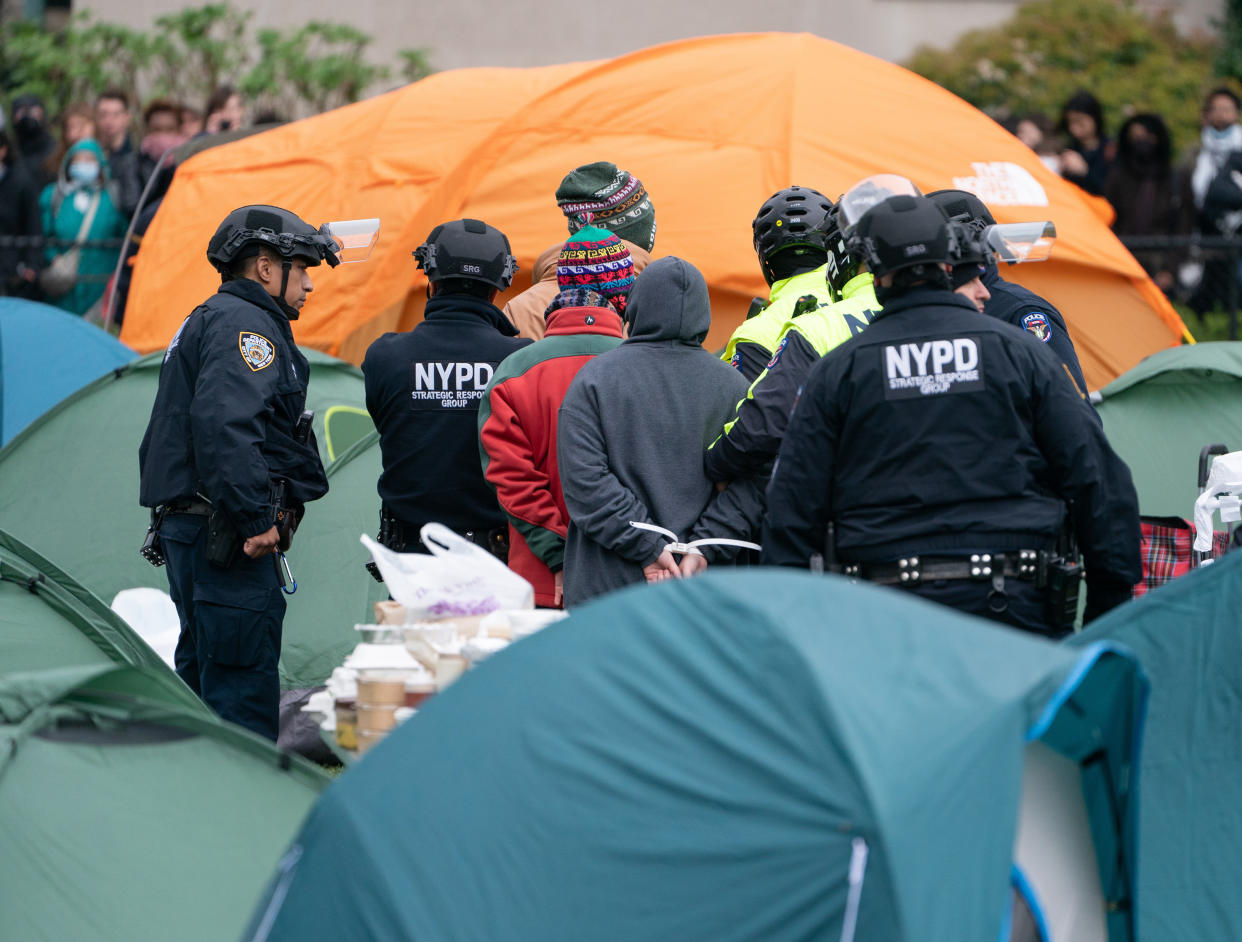Jewish students at Columbia University ask to study remotely as pro-Palestinian demonstrations continue

NEW YORK — Defiant students at Columbia University continued Friday to protest the war in Gaza as some Jewish students, citing ongoing tension on campus, requested permission to study remotely.
The Jewish students said they felt threatened by the large, unrelenting protests surrounding the campus gates. One masked protester reportedly vowed to a group of Jewish students passing through campus to repeat Oct. 7 “10,000 more times.”
“We do not feel safe walking to nor around campus,” read the open letter with 97 signatures as of Friday night. “We urge the administration to allow us to attend classes virtually until the situation has entirely deescalated.”
One day after university President Minouche Shafik tapped the New York Police Department to clear a campus encampment and arrest more than 100 demonstrators, dozens of students took over another campus lawn with blankets and Palestinian flags. They got up before the sun rose and calling on their classmates to join them with warm clothes and blankets, social media posts from overnight show.
A large sign from the original series of tents, pitched earlier this week, continued to advertise the “Gaza Solidarity Encampment.”
Throughout the day, the protesters continued to chant and dance. The campus chapter of Jewish Voice for Peace, which was one of two student organizations suspended from campus last semester, was organizing a Sabbath celebration in the encampment zone.
One undergraduate student told The New York Daily News that the more university administrators try to “silence us,” the more she and her classmates will fight back.
“Seriously, that’s why we’re here,” she said. “Because you can’t tell us to shut up.”
The encampment went up shortly before Shafik earlier this week defended in front of Congress her handling of rising campus antisemitism amid the Israel-Hamas war.
Pro-Palestinian protesters, including students from CUNY and New York University, on the perimeter of Columbia, continued to show support for Columbia students. Campus gates were locked for the fifth day in a row.
Chapters of Students for Justice in Palestine throughout the country, including at University of North Carolina, Chapel Hill and Miami University in Ohio, shared photos of their own tent demonstrations on social media to back Columbia.
“While the encampment has been dismantled, our community has had protest activity on campus since October, and we expect that activity to continue,” a university spokesperson said.
“We have rules regarding the time, place, and manner that apply to protest activity and we will continue to enforce those. We remain in regular contact with our students and student groups and are committed to ensuring the core functions of the University continue.”
NYPD said 113 people were arrested Thursday at Columbia, including several more protesters since Mayor Eric Adams and top police brass held a news conference that night.
On Wednesday before sunrise, student protesters at Columbia set up dozens of green tents on the main campus lawn, demanding the university divest its finances from companies and institutions that profit from Israel.
Columbia instructed participants to disperse by the late morning. When many students refused, university officials delivered an ultimatum: leave that night or face suspensions.
“During the suspension, you may not go to class or hand in work related to courses and therefore may not be able to complete your current courses. Your CUID will be deactivated, you will not have access to classrooms and other parts of campus and may not participate in University activities,” read the notification.
After multiple warnings, cops in riot gear moved in early Thursday afternoon and arrested all demonstrators. Most were released with a summons for trespassing but told to return home.
Columbia officials said Friday that students who face suspensions in general will be able to return to their dorms. Some students at Barnard College lost access to residence halls as a result of the disciplinary action.
With just weeks left in the semester, it was unclear Friday if the suspensions would jeopardize students’ chances of finishing their coursework.
“We faculty asked if students’ devices could please be kept separately so that students might have a chance to finish their school work,” said Rebecca Jordan-Young, a professor of women’s, gender and sexuality studies at Barnard.
But a photo of student belongings tossed in a pile went viral on social media.
“Their devices and all belongings were gathered up and thrown into trash bags and bins as if it was somehow a public safety emergency to get not just the students but all their belongings off that lawn,” Jordan-Young said.
_____
(New York Daily News reporters Téa Kvetenadze and Thomas Tracy contributed to this story.)
_____

